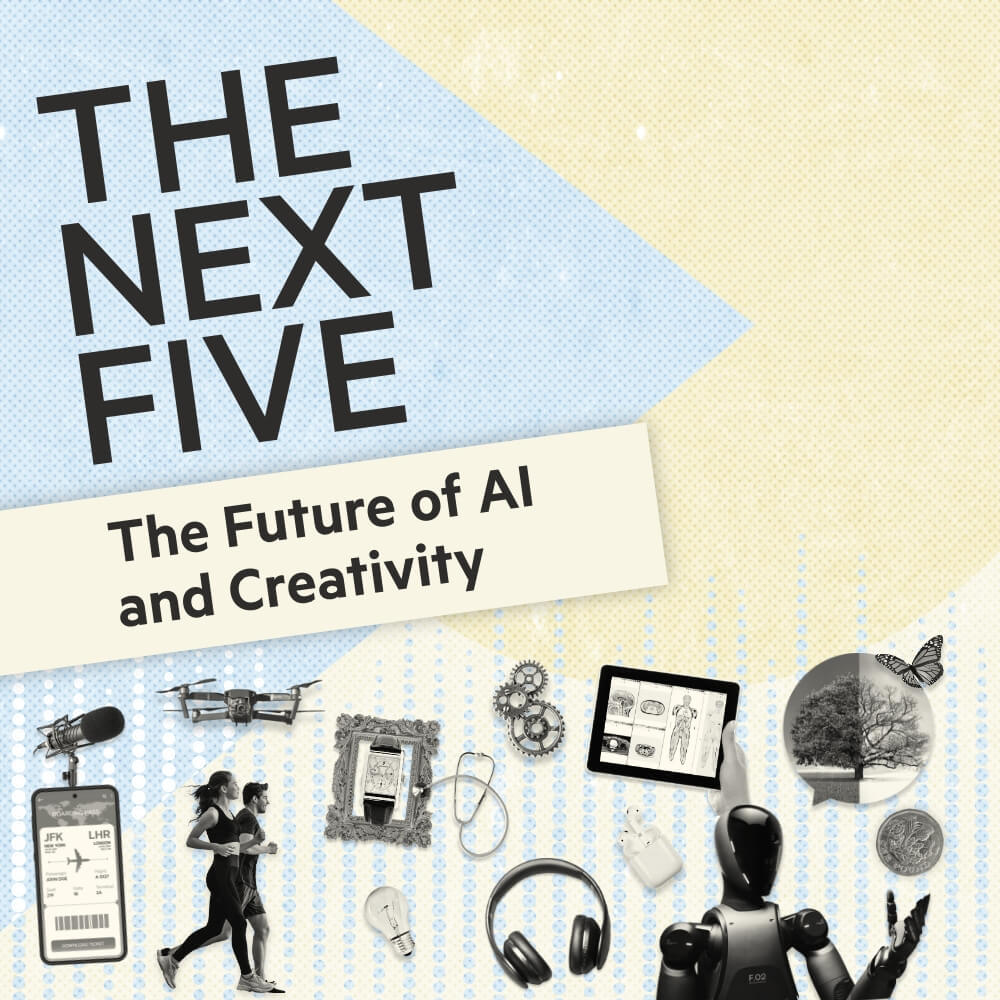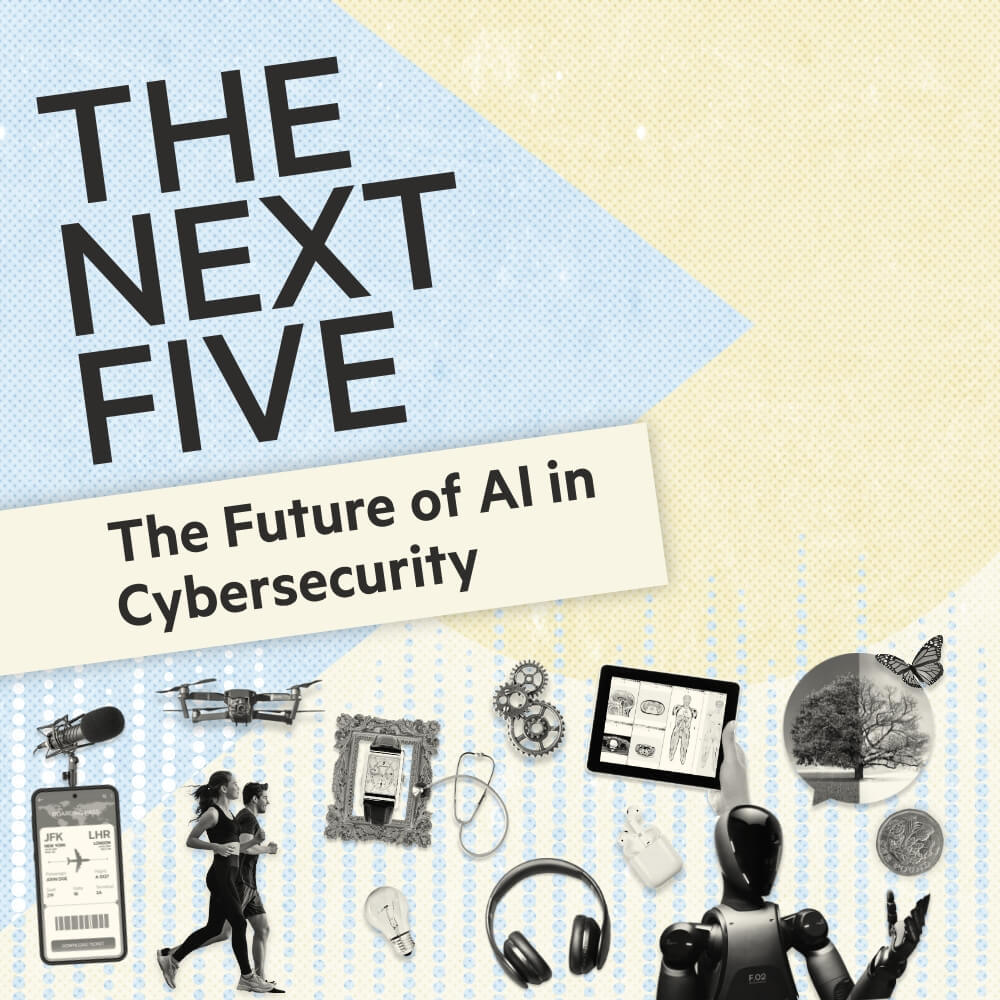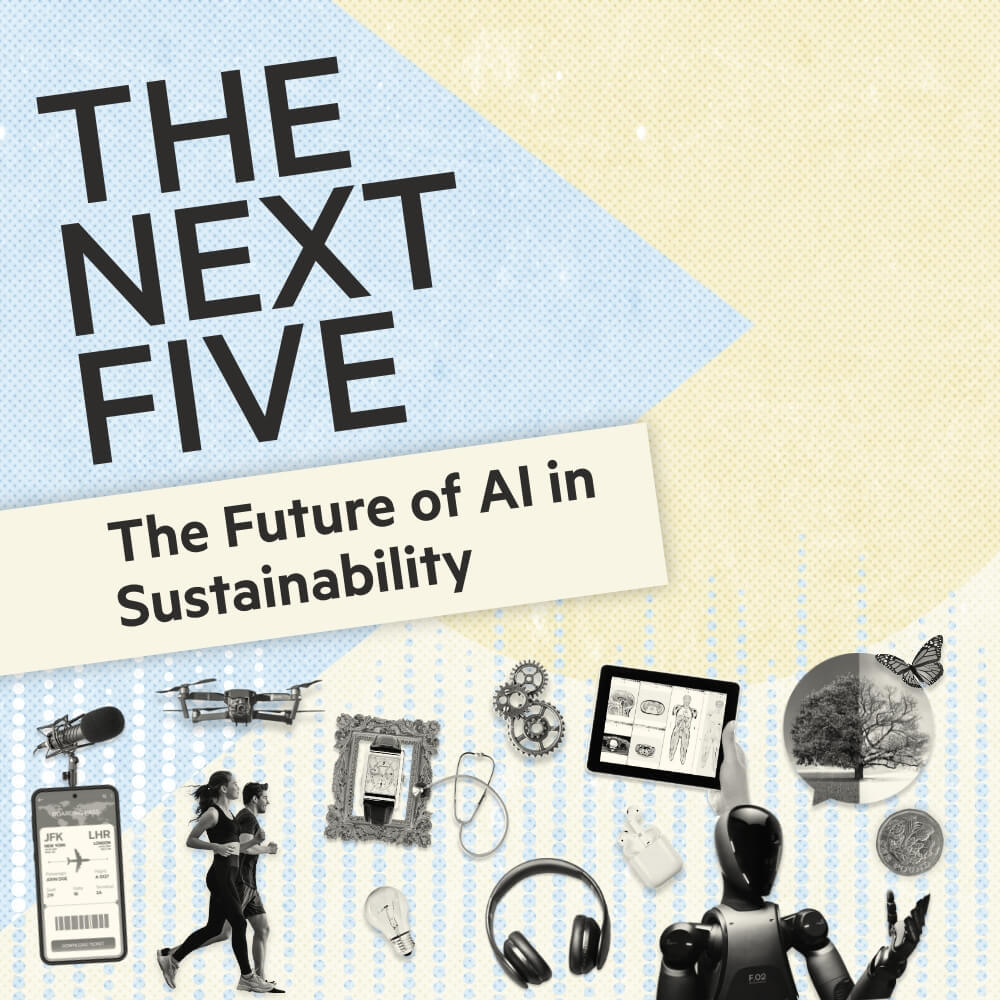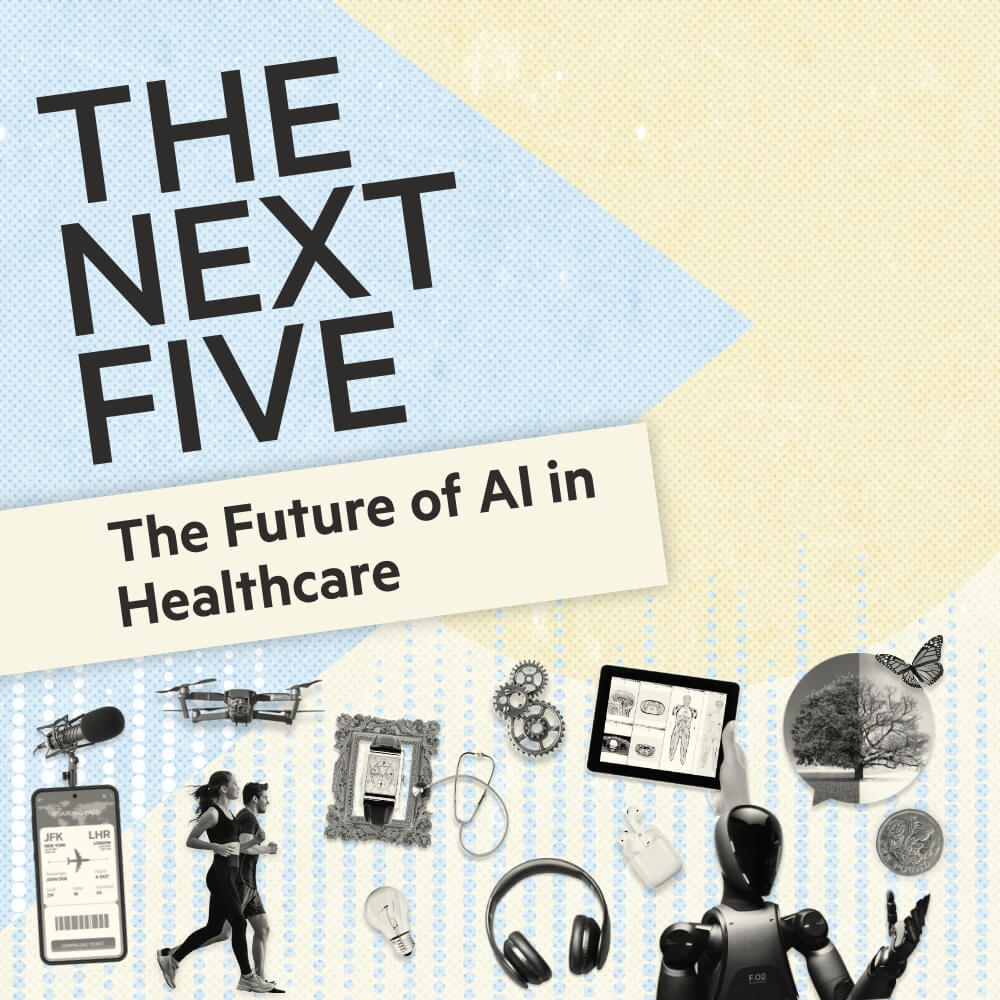THE NEXT FIVE
THE NEXT FIVE - EPISODE 18
The Future of AI and Productivity
The imperatives for Europe: digitalisation and AI within the workforce






































The Next Five is the FT’s partner-supported podcast, exploring the future of industries through expert insights and thought-provoking discussions with host, Tom Parker. Each episode brings together leading voices to analyse the trends, innovations, challenges and opportunities shaping the next five years in business, geo politics, technology, health and lifestyle.
















Featured in this episode:
Tom Parker
Executive Producer & Presenter
Andrea Renda
Head of Global Governance, Regulation, Innovation and the Digital Economy at The Centre for European Policy Studies (CEPS)
Anna Anderson
CEO and Co-Founder of RigaTech Girls
Inger Paus
Public Affairs Director at Google Europe
The EU must prioritise digital skills development, bridge the existing skills gap, and foster an innovation-driven environment. By embracing AI and equipping its citizens with the necessary skills, the EU can navigate current challenges and secure its position as a global leader in the digital era. In the third episode of this five-part miniseries, we look at AI's role in workplace and productivity.
In this episode we speak with Andrea Renda, Head of Global Governance, Regulation, Innovation and the Digital Economy at The Centre for European Policy Studies (CEPS), a think tank based in Brussels that undertakes research “leading to solutions to the challenges facing Europe today". Anna Anderson, CEO and Co-Founder of RigaTech Girls, an NGO which is the only organisation in Latvia specifically dedicated to the cause of advancing women in technology. Inger Paus, Public Affairs Director at Google Europe further discusses the impact of AI on the economy and productivity within the workforce over the next five years.
Our Sources for the show: ERT, European Commission, Public First, CEPR, IBM, EY.
READ TRANSCRIPT
- Tech
Transcript
The Future of AI and Productivity
“AI presents the EU with a once in a generation opportunity to boost its economic competitiveness and can help address many of the challenges Europe is facing. Yet according to the European Commission, only 54% of Europe’s workforce had at least basic digital skills in 2022 — far from the target of 80% in 2030 set in the DESI.”
Soundbites:
TOM: 00:05 The European digital skills gap is a major concern
Anna 07:20 about 43% of adults don't have the necessary digital skills to be fully integrated and participate fully in this digital economy
00:22 AI could help plug the gap and support the economy.
Inger
AI could increase the size of the EU economy by 1.2 trillion euros
TOM: 00:27 But regulation and governance are key
ANDREA 24:47 If Europe gets data governance right, it can actually leapfrog on AI and use AI for good.
TOM
I'm Tom Parker, and welcome to the next five podcast brought to you by the FT partner studio. In this series, we ask industry experts about how their world will change in the next five years, and the impact it will have on our day to day. We’re continuing our special 5 part mini series where we take a deep dive into the world of AI. Each episode is focusing on an industry sector where AI is having and is set to have a big impact.
This third episode in the series is all about AI and productivity, focussing on how AI could help European economic growth and competitiveness as well as discussing challenges such as a widening digital skills gap.
MUSIC FADE
TOM: 01:18 In March 2023, European heads of state and government named the global technology race as a key consideration for Europe’s future competitiveness and global influence.
However, a stark admittance by the European Round Table for Industry suggests that the days in which Europe is at the forefront of industrial development and innovation are over. The continent’s competitiveness has waned due to sluggish productivity growth, an ageing population, insufficient strategic investments, inadequate R&D spending, and a growing skills gap.
According to the Centre for European Reform, European companies lag behind their US competitors by a long way, adopting technologies some 10-15 years later. Europe’s position compared to economic powerhouses and tech superpowers such as the US and China has been a growing concern over the last decade. In 2008, Europe’s economy was worth 16.2 trillion dollars compared to the US’s 14.7 trillion. But in 2022 Europe’s GDP stood at 16.6 trillion, 65% of the US’s 25 trillion. China for comparison sits at 18 trillion dollars. So something needs to be done if Europe is to compete on the world stage again.
TOM: While there is no one size fits all solution, the fourth industrial revolution spurred on by advances in AI could offer some optimism for Europe’s economy and future prosperity. AI is poised at a technological tipping point, and if employed in an innovative, safe and responsible way, could afford Europe the chance to improve its economic competitiveness and address many of its pressing issues.
Inger (02:17.337)
Clearly, with all the excitement you see around AI in Europe in particular, we have a once-in-a-time opportunity.
TOM: This is Inger Paus, Director of Public Affairs for Europe at Google.
And maybe also to address a few of the challenges which the European economy in particular has, for example, with regards to GDP growth, but also productivity of the average worker. And we asked a research company, Public First, to dig a little bit deeper into the AI opportunity, and they found out that AI could increase the size of the EU economy by 1.2 trillion euros and save the average worker over 70 hours a year. That's a big thing actually. So what do workers actually think about this? 74% of workers in the EU think that generative AI tools will help them to be more productive. So there is affirmation actually of people to really take this up and use the opportunity. At the same time also businesses, their employers, are telling us that they want to invest in AI based on automation. More than half of them are planning this in the next five years.
TOM: While the US and China are leading in technological advances especially in AI, Europe does have some unique opportunities to gain a competitive advantage
Inger (19:45.665)
I must say I was a little bit puzzled to see many stakeholders in the European Union be kind of frightened that they lost the technology train, this time the AI train already. And the US and China are running ahead. At Google, we don't think so at all. We think that the European Union is a very strong position to seize the economic and societal benefits of AI. So first of all, take the innovators. There's a good reason why Google DeepMind, our research arm, is sitting in London because you've got access to really super skilled people from the universities. The same is true with Mistral in Paris and Aleph Alpha in Heidelberg. They've got very strong ties to academic institutions and this is a natural strength of the European Union. On the other hand, reminding ourselves what our strengths and competitive advantage is, is actually our strong industrial base. And if you see, if you recall that some of the first breakthroughs in AI research with AlphaFort actually were tied to the innovation and invention of new pharmaceuticals. We've got a strong base and a strong sector here on pharmaceuticals but also in manufacturing which will benefit big time from the innovation for example in materials sciences. It's not just about the kind of next wave of automation it's really also about the innovation and research potential of AI.
And if you want to make sure that every citizen, every worker in Europe can
benefit from these technologies, there's a lot to do actually. This is why we definitely need to leverage AI adoption much faster to make sure that everybody has an opportunity to benefit from the technology.
TOM: To take advantage of this innovation opportunity, digital skills are essential for both individuals and businesses. However, according to the European Commission, only 54% of the EU's workforce had, at the very least, basic digital skills in 2022, falling short of the 80% target set for 2030. One particular NGO based in Latvia, is Riga Tech Girls, an inclusive community of women and men who are working on empowering others through technology and promoting diversity to close the gap.
Anna Andersone (03:56.378)
If we look at the data, then according to the European Commission, there is a digital skills gap all over Europe,
TOM: This is Anna Andersone, CEO of Riga Tech Girls.
So in Latvia, about 43% of adults don't have the necessary digital skills to be fully integrated and participate fully in this digital economy. And if we look at older age, so 65 plus, then it's even higher. So 64% of adults don't have these digital skills.
Anna Andersone (04:41.39)
And if we look at professional digital skills, then there are currently more than 10,000 IT job vacancies in Latvia. However, we only have a couple of thousand graduates every year. So every year there is a bigger gap in the professional skills market. And there are some estimations that several billion euros are lost in our...GDP every year due to the lack of this skilled workforce. If we look at the data on EU average or UK, then it's quite similar in the European countries. For example, but yeah, I want to stress that in Germany, the results are better than in other countries and the proportion of adults with advanced digital skills is about 15 percent, while in the UK only about 7, and the average in the EU is about 8 percent. So what Latvia is doing and what many of the countries are doing is investing in these digital skills and the targets are to reach 15 or more percent of adults with advanced digital skills.
TOM: And with the advent and fast evolving sector of AI, training and adapting to the AI landscape is paramount.
Anna Andersone (17:44.19)
I think it is important for the labor market to understand the basics of AI, to be part of this new development, and of course developing the existing skills and using AI tools in efficiency. So, these are some of the things that the labor market should be learning and trying to stay up to these latest developments.
Anna Andersone (15:26.19) And what I want to mention here is that if we think about statistics, then according to a recent report by the European Commission, there is a current shortage of several hundreds of thousands of AI specialists in the EU. And this gap is expected to widen to 850,000 by 2030. So there's a huge gap. And what we kind of have seen here in Latvia is that the interest in technology is rising. And there's also a huge interest in AI. However, there is also...some skepticism and there is fear of the unknown. So people are a little bit afraid to actually go in and explore these new opportunities.
Anna Andersone (20:11.418)
So we cannot expect the whole society to become very tech savvy and use AI in their everyday lives very, very soon.
TOM: Indeed some fears do exist around the use of AI, placing a huge importance on the foundation of safe and transparent regulation, an area where the EU could become global leaders and set a gold standard. 04:57 The EU AI Act, agreed in December 2023, aims to do just that and has drawn a significant line in the sand on regulation.
Inger (22:20.077)
First of all, when you want people, businesses, organizations to adopt new technologies, which are unfettered ground, you need to first of all, instill trust, because not everybody has, let's say the advantage of being able to take risks like a researcher. So I think the AI Act hopefully will provide this kind of instill of trust in the technology because it provides safeguards. But it's crucial that in the implementation of this regulation,
pragmatic solutions how to do this in a way that doesn't stifle innovation. This is still to be sorted out. I think that will be a big task for the next one to two years and I also think we need now we've figured out the regulatory safeguards needed to focus actually on the enabling policies. The EU is doing a lot already investing into research programs like Horizon, investing into high performance computing, investing into skills but I think it's a good time now to review actually what has worked, what doesn't work and how do we get these programs fit for the future for the next mandate of the European Union.
TOM: The key is to create a balance where regulation doesn’t stifle innovation and allows for productivity gains and open the door for workforces and companies to invest in AI. But this is a challenge for a 27 state European Union and means the technical details of the AI act could take a while to finalise.
Andrea Renda (18:32.798)
The challenges are deploying AI in a way that is fully European, openly accessible, open source, perhaps with the European, autochthonous large language model or a plurality of large language models.
TOM: 05:21 This is Andrea Renda, Director of Research at the Center for European Policy Studies, the oldest and largest think tank in Brussels. 05:31 He is also a member of the high level expert group on AI in the European Commission, Chair of the OECD working group on AI risk and accountability. And co-founder of the International Forum on Cooperation 06:12 in Artificial Intelligence.
And the challenges are also trying to navigate the fast changing subject matter with our normally quite heavy handed way of regulating things.
Andrea Renda (20:04.165)
With AI, I think member states have different preferences. They see the different structures, their economies.
Some of them would want more regulation. Some of them are more scared about, I don't know, the rule of law consequences of AI and mass surveillance. Others might want to have more leeway for industry. But no one has a deeply entrenched position.The first steps of AI policy in Europe were actually inspired by the observation of the fact that all countries or member states were going it alone. They had completely different AI strategies. And so the European Commission stepped in and decided to create this sort of coordination between the member states that then led to a white paper on AI. And a lot of consensus was reached back then. Now the key issue is not really because member states are fragmented, it is that the council, which is rather compact, is in a different position compared to the commission in the European Parliament. And even without going into all details, what I can say in this respect is that I see an obsession to try and nail down each and every aspect of future AI policy in one single piece of legislation, as if AI will not change anymore after this.I'll make one example.
It will be between 18 and 24 months before the AI Act enters into force. You can only imagine what will happen in this 18 to 24 months. They will make the text obsolete. So people would go mad and they will try to reopen it again and so on and so forth. So there is a, in academia, this stream of literature that is called adaptive regulation, uh, which tries to be more agile, less prescriptive.
And it is more like a law as a living entity rather than law in the books, if you wish. And I think this is the exercise in the AI Act. You need to create an AI office or an AI agency that continues to update the state-of-the-art knowledge on AI and transform that into regulatory certainty and rules when they are needed.
TOM: 06:19 The consequences if Europe doesn't set a standard on regulation as well as embrace AI fully, within working environments, especially around productivity and industry are huge and could widen the GDP gap of Europe 06:37 against US and China.
Andrea Renda (31:23.382)
Perhaps there is a little bit of a regret because had the AI act been finalized in February, 2023, Europe would have clearly consolidated its leadership in regulating AI around the world. It was not finalized. So what happened? China immediately regulated a generative AI also because do you want to have a GPT that tells you anything about the Communist Party in China? Of course they regulated it. Page one of the regulation says, Generative AI has to be aligned with socialist values. The UK and the US have taken important initiatives. The US executive order on AI is really not a law in and of itself, but it's really a very significant attempt to, sector by sector, federal agency by federal agency, either regulate or build best practices or give interpretive guidance.
Andrea Renda (32:15.382)
And the voluntary commitments on AI that have been launched by the White House also are a very important move towards at least reaching an agreement with the leading tech giants on the so-called guardrails in frontier AI systems. What the G7 has done on the Code of Conduct, what the UK has done with the Bletchley Declaration, what the United Nations multi-stakeholder
ahead of the EU as the EU is still trying to finalize the AI Act. So all this is problematic for a continent that once was shining as an example of trailblazers in trustworthy AI regulation.
The consequence is that Europe will now be able to compete with other parts of the world that will use AI to increase their productivity and competitiveness. This will lead to loss of global market share and impoverishment of Europe, which means a shrinking economy in Europe compared to the rest of the world. And so our real advantage at the moment, which is the fact that Europe is still the richest single market in the world, is not be there anymore. And even the ability of Europe to export its standards, the infamous Brussels effect and things like this will also become even weaker than they are now. I actually think they are weak at the moment, but they become even weaker because I think the European Commission had gotten it right. You need an ecosystem of trust and an ecosystem of excellence. If the ecosystem of trust has no trust around the world and the ecosystem of excellence is not excellent, I think we're in trouble.
TOM: 06:44 It is clear that the EU must prioritise innovation driven regulation to build trust as well as harness digital skills development to deliver industry excellence. By embracing AI and equipping its citizens with the necessary skills, the EU could navigate its current challenges and secure its position as a global leader in the digital era. But to do so the next five years are critical.
Anna Andersone (35:39.723)
So across the whole economy, the AI will be influencing the workforce and the job market and the economy as such.
Anna Andersone (36:07.95)
And so what we will see is a rise in the demand for software development, data science, AI engineering. So these are the kind of specific job positions that will definitely be needed in the upcoming five years.
And this is something that we definitely need to focus on when we think about our strategy in education, in training, and in lifelong learning. And so we also need to have our government think about these things and include it in the strategy to prepare for the future.
Unfortunately, there will be this skills gap. So we will need to upskill, reskill a big part of the workforce.
Anna Andersone (38:32.482)
and we will need to somehow fill this gap that is in the demand of AI-driven jobs. And we will definitely see employment polarization. So there will be a growing number of highly skilled jobs and there will be a decline in the middle-skilled jobs. So that is something that we need to somehow figure out how to work with.
Anna Andersone (40:50.194)
I would also hope to see increased use of AI in the workplace, so use AI to automate tasks, improve decision-making, enhance productivity, so...use the AI to automate anything that is potentially possible to automate. So in the finance sector, potential fraud or in any sector and use the data efficiently and with great results.
Anna Andersone (44:15.123)
But most importantly, my hopes for the upcoming five years in use of AI is first of all, a shift in the mindset. So I hope to see that the Latvian workers will be comfortable in using AI in their everyday lives and their work and to...
make maximum use of that in doing their jobs better and becoming more efficient and operating their tasks better. So use kind of change the mindset that they can use the AI for their own benefit.
Inger (24:01.477)
I think there's a great consensus amongst governments in the European Union. What are the key success factors to make sure that the European Union can take advantage of this technology? One of the things is definitely we need to invest in talent because ultimately it's about people who are driving this innovation and who are kind of delivering the innovation which is resulting out of it. And we have a big problem actually here. We are seeing demographic developments which actually call for more automation and freeing up more talent for the kind of strategic and innovative tasks.
Inger (26:02.625)
So we need a big skilling effort across the European Union, much bigger actually than we thought. The second thing is, if you take into account that the US is investing twice as much into AI research and development, there's, despite a lot of EU programs like Horizon, a lot of room actually to look into how to reallocate resources towards this big opportunity,
and assess how to shape the next EU horizon programs. Last but not least,
Europe and European leaders are very proud of the European style of life and rightly so, because it has been a guarantee for prosperity, for equal opportunities, for social cohesion for a very long time.
And you see with the increasing polarization of European societies that governments and also employers and technology companies like Google are very concerned about how this will look in five years if we don't counteract. So I think technology surely is not a solution to all of these challenges, but clearly making sure that all of Europeans have equal opportunities to have a career, to thrive in their job
benefit from technologies also in their private and social lives is a big task and a big obligation of European policymakers, but equally of companies, employers, but also technology providers. So I think we all should have a large conversation about the opportunities, how we want to seize them together and form a big alliance on the AI opportunity for Europe, rather than discussing the risk and how we will look like versus China and the US. This is what I wish for Europeans for the next five years.
Andrea Renda (47:31.126)
Well, if you listen to Elon Musk in his conversation with Rishi Sunak, there's no need for skills, right? Because AI is going to replace all jobs. Since I don't believe that, and I think that is a wild exaggeration, I actually believe that a world without jobs is a very unstable world anyway, and a very inefficient world at the same time. We are in the business of finding good human machine cooperation in a variety of sectors.
Andrea Renda (52:28.438)
So one thing that in my opinion is very important is that if you wanna make the most of AI, you have to integrate, collect, and make the most of the data that are out there. And Europe has tried to do this by creating data spaces for specific sectors and so on, but it hasn't really nailed down the correct data governance to date. If Europe gets data governance right, it can actually leapfrog on AI and use AI for good. Much more than other countries will be able to do. Second thing, what I'm really worried about at the moment is that the conversation and the discussion on future AI governance revolves mostly around safety, the extinction of the human race. We even heard Ursula von der Leyen talking about the extinction of the human race in her State of the Union speech. and not enough about how do we deploy AI for good and how do we give access to the benefits of AI also to the global south. The only two initiatives that we have at the moment that talk about access to AI in the global south are, one, believe me or not, China's approach to global AI governance, and second, the United Nations process that started with the creation of the multi-stakeholder advisory body on AI that should in principle target AI for the sustainable development goals and AI for the global south as well.
Andrea Renda (55:06.21)
What we need to do in the next five years is find a way to share data and resources to really deploy AI where it can be most useful. AI is perhaps our only chance at the moment to get the fight against climate change right. It's an ingredient in the future recipe, by itself it's not going to help us solve all the problems. AI is also instrumental for us to understand quantum physics much more.
It is the key for us to understand how our brain works and the key also to get global health to advance much more. So looking at all these opportunities, I think we need to get global AI governance right. And I hope the United Nations can do this going forward by empowering, maybe with the help of a group of experts, each and every agency and institution in the United Nations, from UNICEF to UNESCO.
to the International Telecommunications Union with the tools that are needed to really put AI to use in the best possible way. To me, it is quite clear. If Tom, you tell me that we could reach the sustainable development goals without AI, I don't care about AI. If you tell me that AI can help us to reach them better and sooner, then I start caring about AI. The rest is all hype, in my opinion. AI is a means to an end, and the end has nothing to do with artificial general intelligence. The end has to do with people, planet, and prosperity.
TOM OUTRO:
07:15 We are at a technological inflection point: New regulation in form of the EU AI Act and the upcoming European elections are opening a window of opportunity to develop a long-term competitiveness strategy and policy agenda for Europe that nurtures the next generation of leading AI-powered companies and equips European industries, scientific communities, small businesses and people with the means to harness AI’s economic potential.
AI provides a once in a generation opportunity for the EU to help boost its long-term competitiveness and enhance performance in the EU’s existing world-leading companies in industries such as automotive or pharmaceuticals. But taking full advantage of this opportunity will require having the right underlying infrastructure, skills base and a supportive regulatory framework in place. 08:10 As Andrea said Artificial Intelligence should all be about people, planet and prosperity. So let’s get it right, let’s set a standard, not just for Europe, but for the world.










